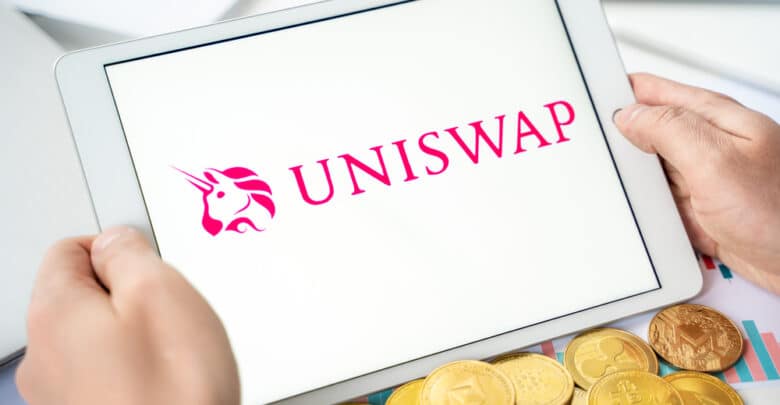Some Web3 investors have labeled a 0.15% fee on front-end interface swaps a case of skewed incentives.
Earlier today, Uniswap’s Hayden Adams announced the protocol’s intention to implement a 0.15% swap charge on their web application and wallet interfaces for the first time. The move by Uniswap attracted mixed reactions, being a major decentralized exchange imposing a swap charge.
Stablecoins Excluded From 0.15% Swap Charge
A blog post by Uniswap Labs shows that specific groups of tokens, which include agEUR, XSGD, ETH, WBTC, EUROC, WETH, USDC, DAI, GUSD, USDT, and LUSD, will be impacted by this new fee.
Nevertheless, the fee application only happens when traded via Uniswap Lab’s interface on supported layer 2s and mainnet. Additionally, the fee only applies if the swap happens between input and output based on this fee. Swaps from stablecoins to stablecoins are not included in the initial charge.
Uniswap Labs spokesperson Bridgett Frey disclosed to a news outlet that they embraced a ‘holistic perspective at how people utilize their product and established the sensible initial tokens list. She added that they anticipate its change over time.
Adam claimed the new fee would go live the next day, permitting Uniswap Labs to ‘keep researching, developing, creating, delivering, enhancing, and expanding crypto and decentralized finance (DeFi). According to other Web3 space leaders, the move was sensible, with Martin Kopplemann, the founder of Gnosis, claiming it was ‘excellent news.’ On Twitter, he wrote that to have robust structures that work at scale, entities that have a sustainable income should be present.
Delphi Labs Counsel Expresses Concerns in Uniswap’s Non-Exit Liquidity
Nevertheless, not every individual supports the idea. For instance, Delphi Labs’ general counsel, Gabriel Shapiro, has been raising concerns on Twitter for a long time, criticizing what he refers to as ‘non-exit liquidity.’ According to him, this has been executed by venture capital amid its significant shift into space.
Further, Shapiro talked about the issue of investors, for instance, those involved in last year’s $1.66B Series B Uniswap Labs, constantly resisting any value addition to Uniswap. However, at the moment, the token has been utilized to acquire liquidity. When asked how Shapiro replied that failing to implement the fee switch has led to the situation.
The Uniswap community can convey some of the protocol’s revenues to governance using the fee switch. In early June, the most recent implementation vote was dismissed.
Web3 Venture Capital Investor Warns Against Equity Value Draining Token Value
Surprisingly, Shapiro’s perspectives echo Nic Carter, a Web 3 VC investor, and a Castle Island Ventures partner. On Twitter, he wrote that he has never witnessed a case showing equity value draining token value’ compared to Uniswap, leading to a clash between token holders and shareholders.’
According to Shapiro and Carter, Uniswap investors have more equity than UNI tokens, hence the disarray between the groups. BlockTower Capital’s founder and CIO, Ari Paul, embraced a slightly different perspective concerning the debate. In this case, he understood that despite charging fees being ‘rational,’ the possibility of UNI holders being conned is high. Such an outcome is possible, given the likelihood of tricky incentives mismatch.
Uniswap Fees Translates to Protocol’s Monetization
With that in mind, Shapiro claimed that Uniswap previously included the fee switch as a ‘value enhancer anticipation.’ In this case, individuals purchase tokens comprising such attributes, hoping for the implementation of the fee switch. Besides, they believe this is how the protocol’s monetization will happen.
According to the Web3 attorney, the fee switch can still be turned on despite users having little appetite for fees. Further, he observed that each fee that applies somewhere in the stack reduces its possibility of being a considerable in-protocol fee and is acquired from the UNI holders’ pockets.
Autism Capital, a pseudonymous account, supported Carter’s and Shapiro’s perspectives by noting that governance is used to vote on the UNI fee switch. However, Adams, as well as the ‘unicorn sparkle crew,’ do not reveal that to their VCs and acquaintances. Additionally, they have amassed the supply’s control, hence voting power and decision-making.
Despite the foul play cries, most supporters supported the newly incorporated fee. Some highlighted the need for a direction for creating a justifiable business path. In contrast, others suggested the need for the protocol to remain permissionless and not compel anyone to pay the fees.
At Tokenhell, we help over 5,000 crypto companies amplify their content reach—and you can join them! For inquiries, reach out to us at info@tokenhell.com. Please remember, cryptocurrencies are highly volatile assets. Always conduct thorough research before making any investment decisions. Some content on this website, including posts under Crypto Cable, Sponsored Articles, and Press Releases, is provided by guest contributors or paid sponsors. The views expressed in these posts do not necessarily represent the opinions of Tokenhell. We are not responsible for the accuracy, quality, or reliability of any third-party content, advertisements, products, or banners featured on this site. For more details, please review our full terms and conditions / disclaimer.



